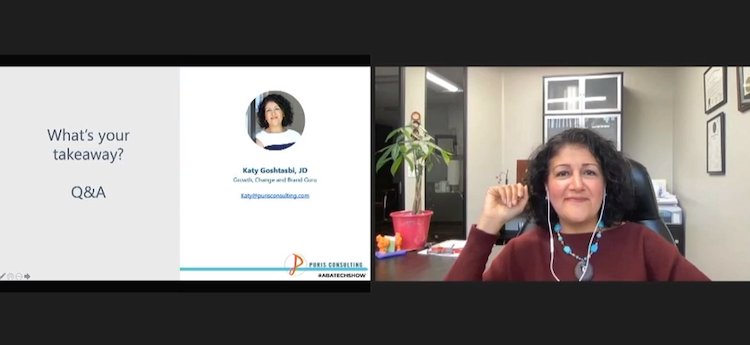Do clients care more about a lawyer seeming smart or likable?

Katy Goshtasbi, CEO of Puris Consulting, speaks Wednesday at the ABA Techshow 2021.
Want more leads that turn into paying clients? Embrace your authentic self and market who you are, even if it initially makes you uncomfortable, says Katy Goshtasbi, the author of Personal Branding in One Hour for Lawyers, a book from ABA Publishing.
Goshtasbi, an experienced securities lawyer who now helps lawyers cultivate personal brands, spoke Wednesday at the ABA Techshow 2021. In her session, titled “How to Use Branding to Maintain a Diverse Legal Workforce and Eliminate Bias, in Any Economic Environment,” she talked about being an immigrant from Iran and working in large Washington, D.C., law firms as well as with the Securities and Exchange Commission.
“When I was in D.C., I used to compete with all the male lawyers. I would strap down my chest, pull my hair back and wear pantsuits. But I had lost my identity,” said Goshtasbi, who advised lawyers to figure out who they are, and then market it.
That can’t be something basic, like saying you are an attorney who always delivers work product on time. That’s something every lawyer should do, and it does not make you unique, she added.
If finding your authentic self makes you a little uncomfortable, she said, that’s good.
“Write your story, find out your natural talents. Find out your ‘why’” said Goshtasbi, who chairs the ABA Law Practice Division Diversity & Inclusion Committee. She also advised finding out what people say about you and being aware about how you present.
“How are you showing up, from head to toe, in court, on Zoom and everything else? What are you saying verbally? What are you putting down in writing about who you are?” she said.
Follow along with the ABA Journal’s coverage of the ABA Techshow 2021 here.
Also, Goshtasbi told the audience that embracing who you are helps mitigate your own biases.
“That’s inclusivity. We are not judging people, we are looking at them for who they are,” she added.
Embracing who you are also alleviates stress, and potential clients do not want to hire lawyers who seemed stressed, she said, adding that people do want counsel who are likable.
“Don’t take ‘likable’ the wrong way. This is not about high school likability. It’s about whether you resonate with me,” she said, explaining that for national brands, including Starbucks, happiness references are frequently used in advertising. For instance, a Starbucks release touts new spring drinks that bring “color and joy.”
“What does joy have to do with coffee? Nothing, but it makes me pay $4 for it,” said Goshtasbi, the CEO of Puris Consulting.
The happiness factor is even an issue in legal practices not known for bringing joy, according to her.
“If you think ‘I’m a divorce lawyer,’ that’s OK. I’m not looking for you to wear a clown hat and be a divorce lawyer,” she said, explaining that if lawyers have “one degree of happiness” more than a potential client, that could get them hired.
“If I’m going to pay someone $500 an hour, I want to make sure it is someone who emotionally gets me to a better place,” said Goshtasbi, who believes that being seen as a smart lawyer is not the top influencer for attorney engagement decisions.
“They’re not buying us as smart lawyers, they’re buying the fact they like us,” she said.



